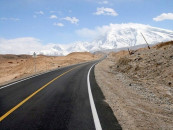Saudi Arabia to import thousands of Pakistani doctors
Govt agency offering doctors triple their salaries to work in Saudi hospitals.

Saudi Arabia to import thousands of Pakistani doctors
Dr Nawaz* (not his real name) is a medical officer (MO) at Mayo Hospital and, like all government-employed doctors in BPS-17, got a Rs15,000 raise last year, taking his monthly pay to Rs44,000. Yesterday, the Saudi Arabian Ministry of Health offered him a job for 6,000 riyals (Rs145,000) a month.
“It’s a handsome offer. I’m going to take it,” said the doctor after an interview with the Overseas Employment Corporation, a Pakistani government agency that is hiring doctors for Saudi Arabia.
At Mayo Hospital, Dr Nawaz has to serve in shifts of up to 48 hours straight. In Saudi Arabia, he will get two days off each week and work eight-hour days.
“Here we have a lot of uncertainty. We cannot get a raise unless we protest and boycott work. I am getting out of it,” he said.
Dr Nawaz has been in a government job for three years and said he would resign before leaving. However, many doctors with more years in government service will likely seek permission from the government to go on leave to Saudi Arabia so they can return to their government jobs upon coming back to Pakistan.
Two private Saudi agencies are also interviewing Pakistani doctors for posts in government hospitals in Saudi Arabia. Saturday was the last day of interviews in Lahore. Interviews in Islamabad will take place from January 11 to 13.
“Around 3,000 doctors have been interviewed in Lahore for different positions including residents and consultants,” an OEC official told The Express Tribune.
He said that the Saudi government had recently built a lot of new hospitals and they were short of doctors. He did not say how many doctors the Saudis aimed to hire from Pakistan.
Residents (trainee doctors) are being offered salaries of between 5,000 (Rs121,000) and 8,000 riyals (Rs193,000), while consultants with a fellowship are being offered between 12,000 (Rs290,000) and 16,000 (Rs387,000) riyals. Senior professors and associate professors are being offered up to 30,000 riyals (Rs725,000) per month.
Last year, the Saudi Ministry of Health hired a thousand Pakistani doctors. Shortly afterwards, government-employed doctors in Punjab went on strike to demand better pay.
“This time they are going to hire more doctors,” said a senior doctor who went for an interview.
“The Indian government has just increased the salaries of public doctors and no Indian doctors are going to Saudi Arabia. They are focusing more on Pakistani doctors this year.” The Pakistan Medical Association warned that the country was losing its best doctors to Saudi Arabia and urged the government to improve the service structure for health professionals to stop the brain drain.
“The government on one hand claims to invest in health and education and on the other it does nothing to stop the brain drain,” said PMA Joint Secretary Dr Salman Kazmi.
“The government announces a pay package for doctors and nurses only when they go on strike or take to the streets. This is no solution. The government needs to develop a structure otherwise we may run out doctors.”
A Health Department spokesman said that the government couldn’t match the salaries offered to doctors abroad, especially when they had only recently been given raises. He said the government spent hundreds of millions of rupees on educating and training doctors and they should consider reasons other than monetary for working in Pakistan.
Published in The Express Tribune, January 8th, 2012.



















COMMENTS
Comments are moderated and generally will be posted if they are on-topic and not abusive.
For more information, please see our Comments FAQ